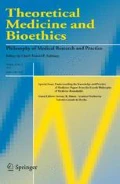Abstract
In 1964, the American Medical Association invited liberal theologian Abraham Joshua Heschel (1907–1972) to address its annual meeting in a program entitled “The Patient as a Person” [1]. Unsurprisingly, in light of Heschel’s reputation for outspokenness, he launched a jeremiad against physicians, claiming: “The admiration for medical science is increasing, the respect for its practitioners is decreasing. The depreciation of the image of the doctor is bound to disseminate disenchantment and to affect the state of medicine itself” [1, p. 35]. Heschel’s reference to “disenchantment” suggests that he may have been familiar with the work, or at least the outlook, of sociologist Max Weber, whose 1917 address “Science as a Vocation” portrays the modern world as disenchanted by the progress of rationalism. Heschel’s life’s vocation had been to uncover the inner meaning of religious faith and to translate that faith into principled action. Heschel saw disenchantment not as an inescapable aspect of modern life but rather as the byproduct of physicians’ conscious choices to seek worldly success and material comfort. Yet, because of their privileged position as witnesses to human vulnerability, physicians possess an obligation to develop their own personhood, to re-enchant medicine, and through medicine to spark a positive transformation in all of modern life. As Heschel says, “The doctor must realize the supreme nobility of his vocation, to cultivate a taste for the pleasures of the soul. … The doctor is a major source of moral energy affecting the spiritual texture and substance of the entire society” [1, pp. 34, 38]. While Heschel’s conception of the physician’s role is romanticized and idealized, changes in the organization and practice of medicine have validated his concerns.
Similar content being viewed by others
Notes
Much of Heschel’s family remained in Europe during World War II, and he lost his mother and three sisters in the Holocaust.
For instance, New York–Presbyterian Hospital recently adopted a credo declaring, “I believe: Every individual who comes to us for care and who works here, deserves my courtesy and respect … I will: Treat others as they want to be treated, with kindness, courtesy, and empathy … I will not: Speak or act disrespectfully toward anyone” [19, p. 3].
References
Heschel, Abraham Joshua. 1967. The patient as a person. In The insecurity of freedom: Essays on human existence, 24–38. New York: Noonday.
Kaplan, Edward K. 2007. Spiritual radical: Abraham Joshua Heschel in America, 1940–1972. New Haven: Yale University Press.
Imber, Jonathan B. 2008. Trusting doctors: The decline of moral authority in American medicine. Princeton: Princeton University Press.
Kim, Daniel, Farr Curlin, Kelly Wolenberg, and Daniel Sulmasy. 2014. Religion in organized medicine: The AMA’s Committee and Department of Medicine and Religion, 1961–1974. Perspectives in Biology and Medicine 57: 393–414.
Menninger, William C. 1964. The patient as a person. Conservative Judaism 19: 10–18.
Weber, Max. 2004. Science as a vocation. In The vocation lectures, ed. David Owen and Tracy B. Strong, trans. Rodney Livingstone, 1–31. Indianapolis: Hackett.
Lasch, Christopher. 1995. The soul of man under secularism. In The revolt of the elites and the betrayal of democracy, 230–246. New York: Norton.
Heschel, Abraham Joshua. 1962. The prophets: An introduction. New York: Harper and Row.
Kaplan, Edward K., and Samuel H. Dresner. 1998. Abraham Joshua Heschel: Prophetic witness. New Haven: Yale University Press.
Rubinstein, Avraham, and Rivka Schatz-Uffenheimer. 1972. Hasidism. In Encyclopedia Judaica, vol. 7, ed. Cecil Roth, 1390–1419. Jerusalem: Keter.
Frankl, Viktor E. 1959. Man’s search for meaning. Boston: Beacon.
Held, Shai. 2013. Abraham Joshua Heschel: The call of transcendence. Bloomington: Indiana University Press.
Carson, Rachel. 1962. Silent spring. Boston: Houghton Mifflin.
Mittleman, Alan L. 2018. Does Judaism condone violence? Holiness and ethics in the Jewish tradition. Princeton: Princeton University Press.
Xu, Rena. 2018. The burnout crisis in American medicine: Are electronic medical records and demanding regulations contributing to a historic doctor shortage? Atlantic, May 11. https://www.theatlantic.com/health/archive/2018/05/the-burnout-crisis-in-health-care/559880.
Verghese, Abraham. 2018. How tech can turn doctors into clerical workers: The threat that electronic health records and machine learning pose to physicians’ clinical judgment—and their well-being. New York Times Magazine, May 16. https://www.nytimes.com/interactive/2018/05/16/magazine/health-issue-what-we-lose-with-data-driven-medicine.html.
Gawande, Atul. 2018. Why doctors hate their computers. New Yorker, November 12. https://www.newyorker.com/magazine/2018/11/12/why-doctors-hate-their-computers.
Pew Research Center. 2015. America’s changing religious landscape. http://pewrsr.ch/1RvkLOU. Accessed December 7, 2015.
New York–Presbyterian Hospital. 2016. Code of conduct. Revised November 2016. https://www.nyp.org/pdf/code-of-conduct.pdf.
Author information
Authors and Affiliations
Corresponding author
Rights and permissions
About this article
Cite this article
Astrow, A.B. On the disenchantment of medicine: Abraham Joshua Heschel’s 1964 address to the American Medical Association. Theor Med Bioeth 39, 483–497 (2018). https://doi.org/10.1007/s11017-018-9472-x
Published:
Issue Date:
DOI: https://doi.org/10.1007/s11017-018-9472-x




